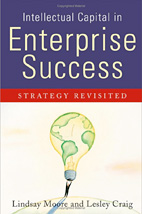Until recently, few organizations seriously considered ethics to be a legitimate topic for enterprise planning and strategic thinking. Those at the top of an enterprise regularly spent time developing their organizational and functional strategic plans, their growth strategy, possibly even their brand strategy, but ethics and regulatory compliance was merely an issue for the finance department, legal counsel, and possibly human resources.
Archives for 2011
Liberation Marketing and Consumer Society
Corporate marketers and advertising agencies eventuated “Liberation Marketing” to trump Lifestyle Marketing. The theory was that brands would pose as revolutionaries acting on our individual behalf by selling the apparatus of “cool,” “hip,” “alternative” – without of course ever actually being cool, hip, or alternative themselves.
Enhancing Profitability with Intellectual Property (PDF)
Even companies with small IP portfolios can leverage their holdings into the free cash flow of licensing income by parsing their IP holdings.
Patents Can Protect Formulations and Processes (PDF)
Many manufacturers overlook the opportunity to patent aspects of their food products or specialised manufacturing processes. This is especially true in the natural products industries, where unusual ingredients are often mixed together and specialised production processes are increasingly required to make successful products. In most natural product categories, it takes substantial innovation for manufacturers to be able to produce successful functional and natural food products.
The State as a Brand
Brand gurus have long declared that all public entities and identities, and not just consumer packaged goods, are “Brands.” Today we see the truth of that assertion as we recognize the emergence of the “Brand-State.”
Reverse Engineering for Competitive Advantage (PDF)
Reverse engineering competitors’ formulations is legal, can be ethical and can benefit a company’s strategic position in the marketplace – if it is pursued in the right way. As such, reverse engineering is a powerful product-development tool that can be used to trump even patent-protected formulations or proprietary compounds, thus enhancing a company’s place in the marketplace.
Library of Canadian Parliament, Ottawa, Canada
The Library of Parliament is the main information repository and research resource for the Parliament of Canada. In the history of knowledge management, bodies of government have always needed to amass large and specialized libraries to do the work of government.
Palace of Westminster and Big Ben, London
Palace of Westminster, Westminster Bridge and Big Ben, London, England. The Palace of Westminster, is the meeting place of the two houses of the Parliament of the United Kingdom—the House of Lords and the House of Commons. It lies on the north bank of the River Thames in the heart of London.



 As the knowledge-based economy expands, the companies and individuals that possess intangible intellectual assets, such as intellectual property, will need specialized expertise, strategic thinking, legal experience, and the wisdom necessary to manage intellectual assets.
As the knowledge-based economy expands, the companies and individuals that possess intangible intellectual assets, such as intellectual property, will need specialized expertise, strategic thinking, legal experience, and the wisdom necessary to manage intellectual assets.